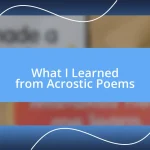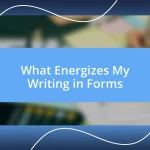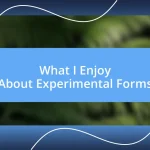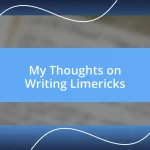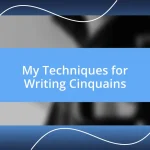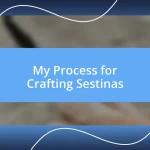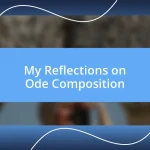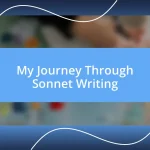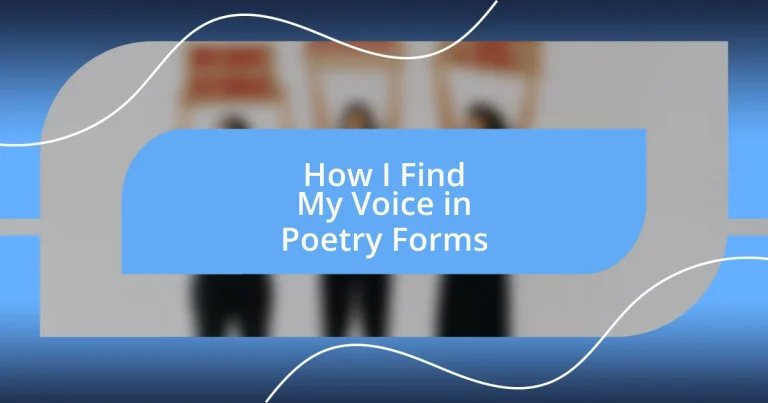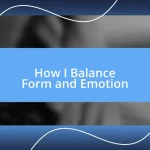Key takeaways:
- Experimenting with various poetry forms, such as sonnets and free verse, reveals unique expressions of emotion and allows for personal growth in a poet’s voice.
- Establishing a consistent writing routine nurtures creativity and discipline, helping poets overcome challenges and tap into their imagination.
- Sharing poetry with others and receiving constructive feedback enhances one’s craft and builds a supportive community, enriching the artistic journey.
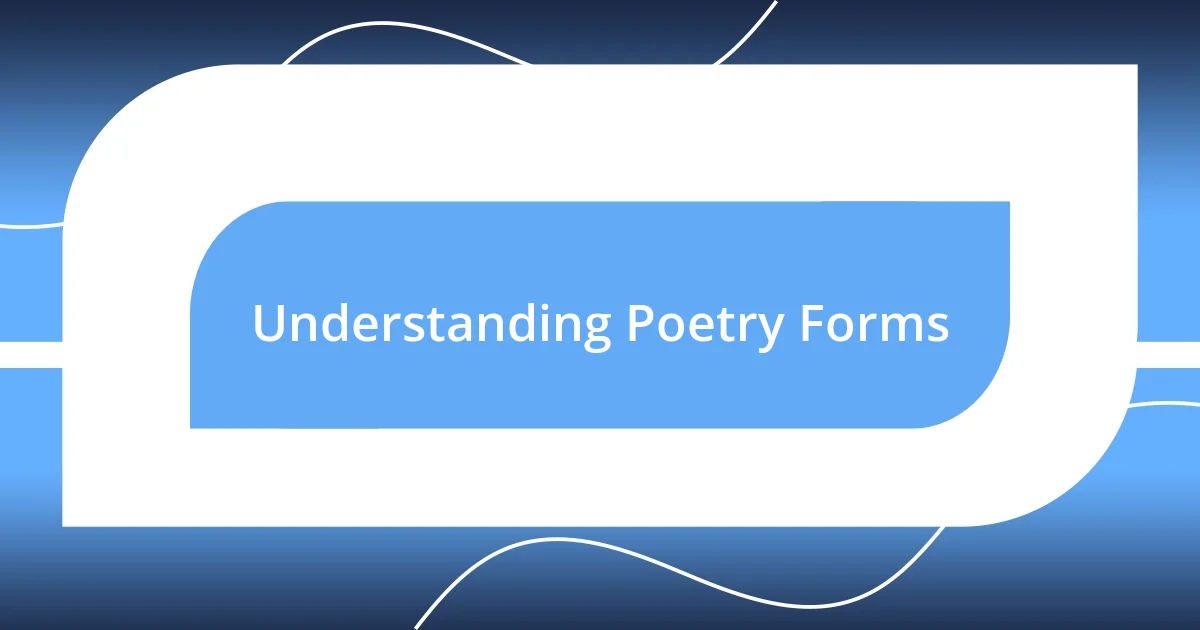
Understanding Poetry Forms
Understanding poetry forms is essential for any poet looking to develop their unique voice. I remember when I first encountered sonnets; I was both intimidated and intrigued by the structure. How is it that a set number of lines and a specific rhyme scheme can evoke such depth of emotion?
Diving deeper into free verse, I felt a rush of freedom. Without the constraints of a strict form, I could explore my thoughts without hesitation. Yet, the challenge remains: how do I maintain rhythm and flow when there are no rules? This push-pull allows for incredible exploration, but it requires self-discipline and a keen ear for language.
As I experimented with various forms, I discovered that each one resonated differently with my experiences. The sharpness of a haiku’s brevity contrasts beautifully with the sprawling nature of a narrative poem, each providing its own unique canvas for expression. Have you ever felt limited by a particular form, only to find it opened up a new perspective on your emotions? That’s the magic of poetry forms; they shape yet liberate our voices in unexpected ways.
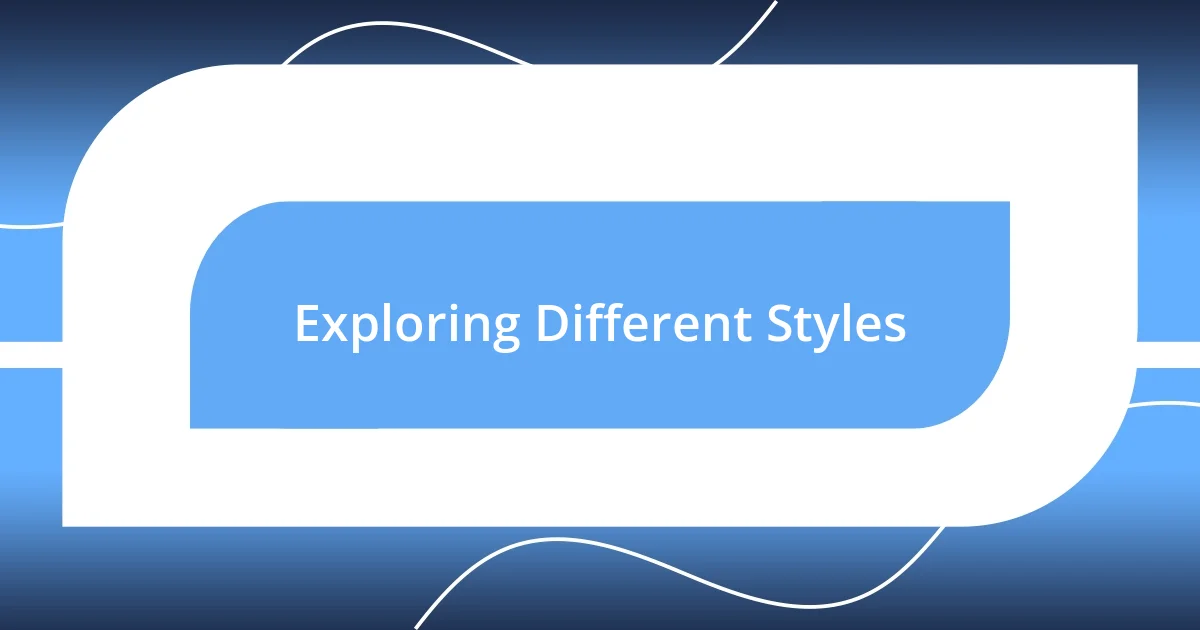
Exploring Different Styles
Exploring different poetry styles has been a journey of discovery for me. When I first dipped my toes into the world of spoken word, I felt an electric connection to performance—a community where passion and vulnerability collide. The way words resonate within a space, capturing listeners in a moment, ignited something in me. I realized that style is not just about structure; it’s about how I present my thoughts and emotions to the world.
Here are some styles I’ve explored and their unique resonances:
- Sonnets: Their rigid form taught me discipline but also opened my eyes to the beauty in constraints.
- Free Verse: This style allowed me to express raw emotions without boundaries, leading to surprising insights.
- Haiku: The challenge of distilling a moment or feeling into just three lines honed my ability to focus on vivid imagery.
- Narrative Poetry: Crafting a story within a poem revealed layers of meaning I hadn’t anticipated, enriching my storytelling skills.
- Spoken Word: The immediacy of performance transformed the way I think about audience and delivery, making poetry feel alive.
Each style influences my voice in ways I never expected, and I find myself inspired to embrace the complexity in blending them, searching for the perfect expression of my truth.
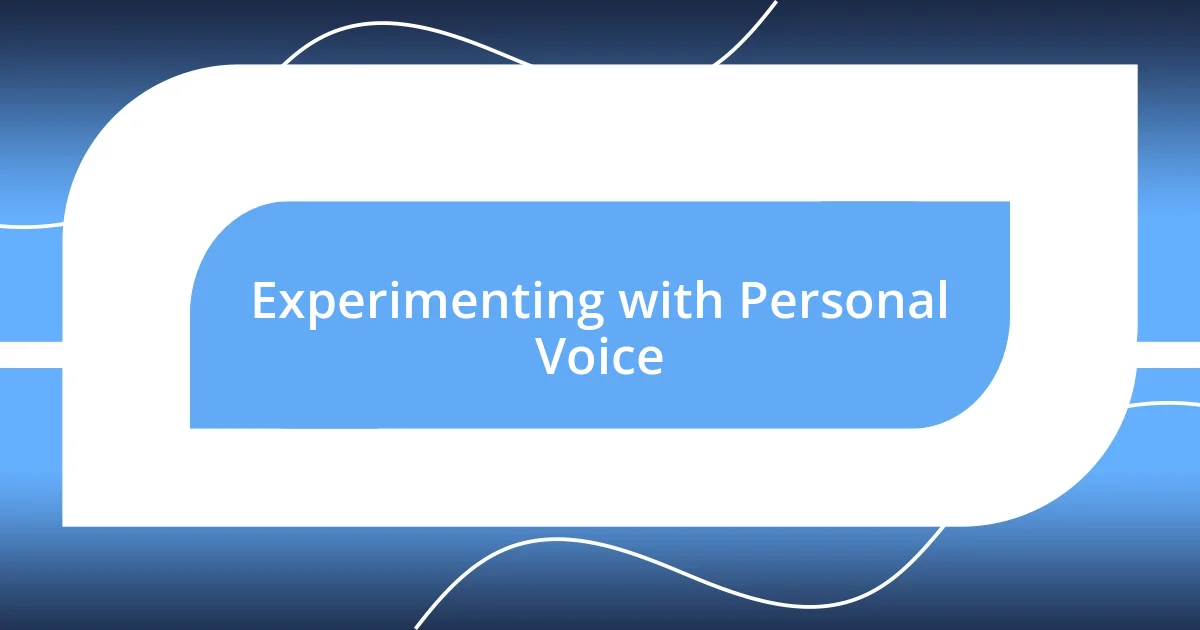
Experimenting with Personal Voice
Experimenting with my personal voice in poetry is akin to a delightful chaos. I remember the first time I wrote a poem in a form I had never attempted before, the pantoum. The repetitive nature of its structure felt like a dance; each line echoed back to me, emphasizing my thoughts with a new depth. It was as though I had discovered a hidden room in my creative house, one that revealed layers of meaning I never knew existed.
As I continued this exploration, I found myself weaving personal stories into different forms, like blending different colors on a canvas. Writing a villanelle allowed me to express a spiraling emotion—a feeling of longing that resonated beautifully within its strict rhyme scheme. The process taught me that my voice is not just in the words I choose, but in the emotions I weave throughout my poetry.
I often play with contrasting forms, combining the crispness of a haiku with the fluidity of free verse. This interplay has become a powerful way for me to define my voice; it reflects the duality of my experiences. Have you ever felt that strange exhilaration when a new piece of work surprises even you? It’s in those moments of experimentation that our personal voice truly comes alive, revealing the multitude of ways we can connect our thoughts and feelings with the world.
| Poetry Form | Personal Insight |
|---|---|
| Pantoum | Its repetitive structure revealed hidden meanings in my emotions. |
| Villanelle | Allowed me to spiral deeper into the feeling of longing. |
| Haiku | Provided a crisp focus on vivid imagery, distilling complex emotions. |
| Free Verse | Enabled fluidity, allowing my voice to roam freely without constraints. |
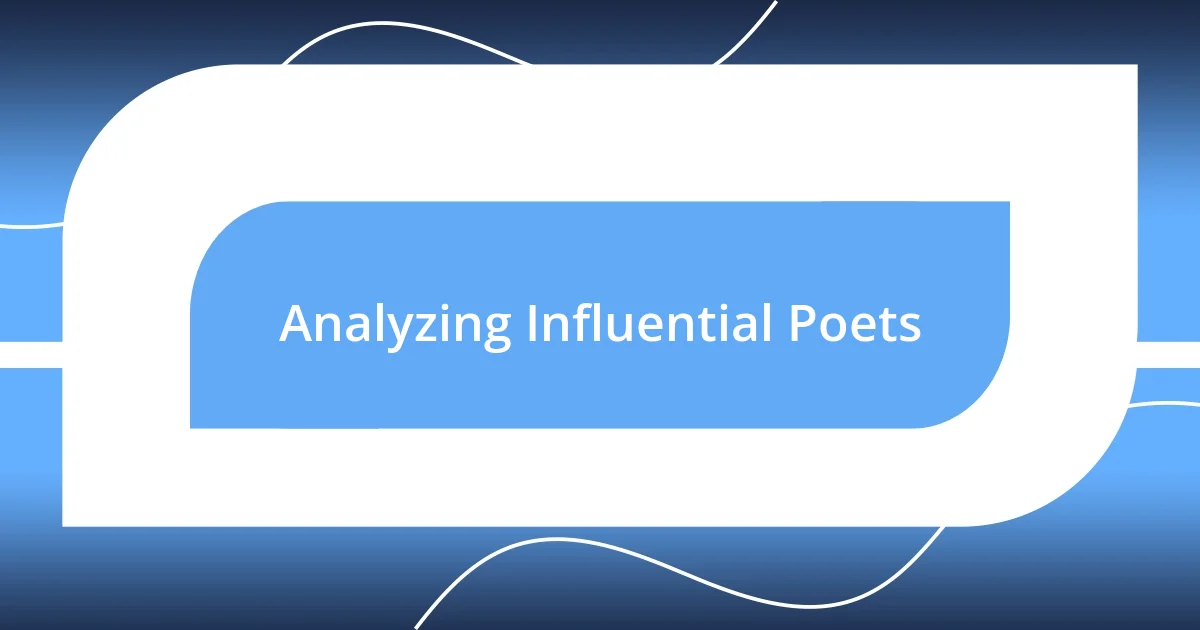
Analyzing Influential Poets
When analyzing influential poets, I find myself reflecting on the power of their unique voices. For instance, reading Sylvia Plath often evokes a visceral emotional response in me. Her confessional style lays bare raw feelings, making it impossible to look away. Have you ever noticed how her intense imagery and stark honesty pull you into her world? It feels like each line is a whisper of her struggles, resonating deeply with my own experiences.
I also admire how poets such as Pablo Neruda captivate readers with their beautiful metaphors. His ability to weave love and longing into tangible imagery inspires me to experiment with sensory detail in my own work. I remember trying to capture the essence of a fleeting moment in nature after reading his “Sonnet XVII.” That challenge of distilling such a complex feeling into a few lines truly pushed me to refine my craft. How can we transform our everyday experiences into poetry that resonates?
Additionally, I can’t help but feel connected to the playful spirit of e.e. cummings. His unconventional use of syntax and structure invites me to break my own poetic rules. I still recall the first time I attempted to manipulate the layout of my lines in a poem inspired by his work. It felt liberating! Isn’t it fascinating how experimenting with form can lead to discovering new facets of our voice? Each poet influences my journey in distinctive ways, guiding me toward a more authentic self-expression in my work.
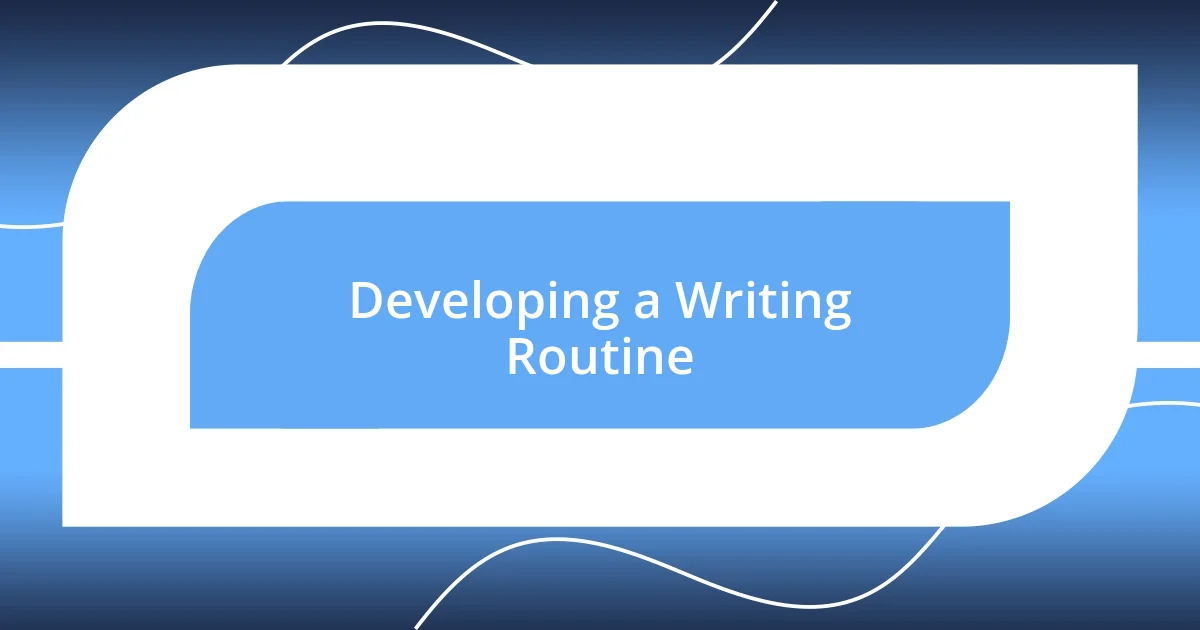
Developing a Writing Routine
Establishing a writing routine has been a transformative experience for me. I remember the mornings when I’d sit quietly with a cup of coffee, allowing thoughts to flow without judgment. This simple ritual has become a sacred time; it’s where I tap into my imagination and let my voice roam freely. Have you ever experienced that liberating feeling when the words effortlessly spill out?
Consistently writing at the same time each day has helped me to cultivate discipline and creativity. There were days when the ideas were scarce, and the blank page seemed daunting. However, I learned that showing up is half the battle. The act of writing, even when it’s tough, nourishes that creative spark; it’s in those challenging moments that unexpected insights often emerge. Think about it—what might you uncover if you commit to your routine, regardless of how you feel that day?
I’ve also realized the importance of setting a specific environment for my writing sessions. Creating a cozy nook with inspiring elements around me—like colorful art, notebooks filled with past works, or even a candle flickering softly—boosts my motivation. Each of these elements whispers encouragement, reminding me why I fell in love with poetry. What small changes can you make in your surroundings to ignite your own creativity?
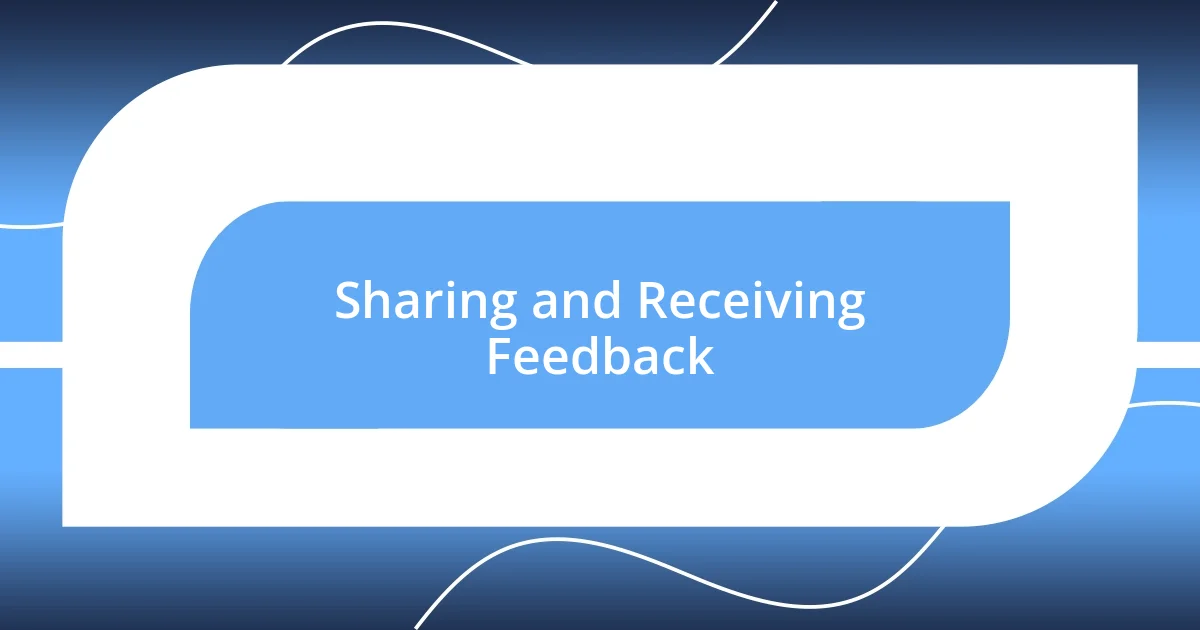
Sharing and Receiving Feedback
When sharing my poetry, I often invite friends and fellow poets to give their feedback. At first, I was nervous, fearing criticism would shatter my confidence. However, I quickly learned that constructive feedback can be enriching. Just the other day, a friend highlighted an emotional disconnect in one of my pieces, which made me realize how valuable that perspective was for honing my work. Have you ever experienced a moment when feedback shaped your artistry in unexpected ways?
Receiving feedback isn’t just about hearing criticism; it’s also about finding those golden nuggets of affirmation. I remember a time when I nervously shared my work at a local open mic. The applause and kind words from the audience bolstered my confidence immensely. It reinforced my belief that my voice mattered, even on days when self-doubt creeps in. How do you navigate the fine line between embracing feedback and staying true to your unique voice?
Equally important is giving feedback to others. I genuinely enjoy critiquing my peers’ poems because it reinforces my own understanding of poetry’s intricacies. One memorable experience was with a fellow poet who was struggling with metaphors. As I provided my insight, I found myself reflecting on my own journey with imagery. It became a wonderful exchange that deepened our connection. Isn’t it fascinating how sharing perspectives can enhance both our voices and those of others?
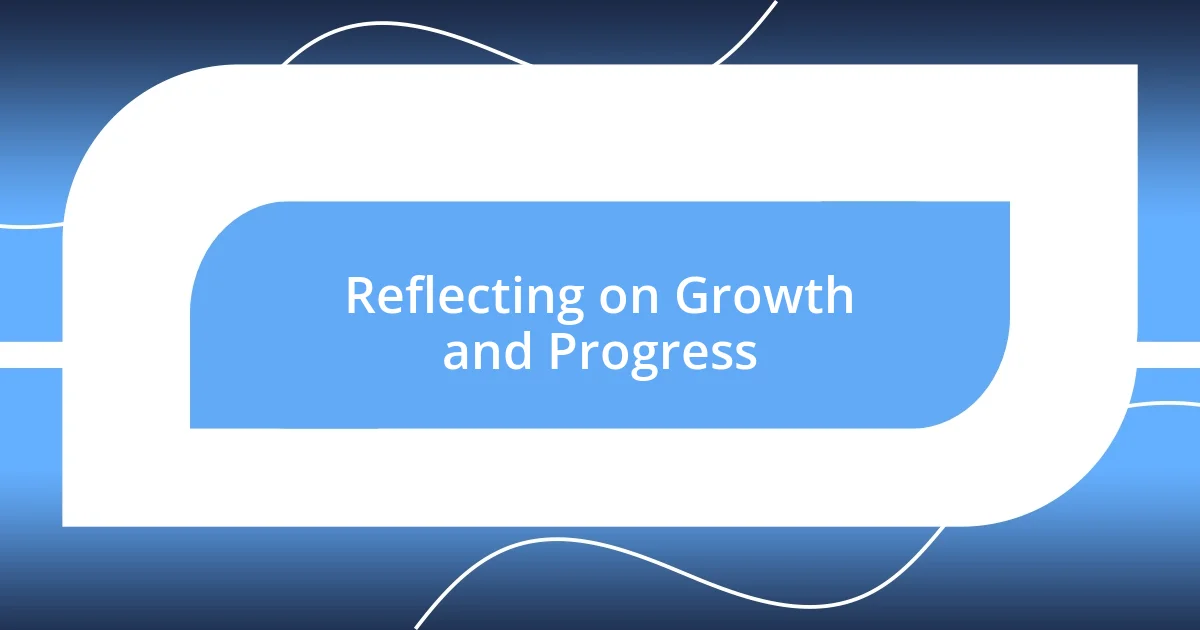
Reflecting on Growth and Progress
Reflecting on my growth as a poet often brings to mind moments when I felt stuck, grappling with my identity in writing. There was a time when I penned a piece that felt disjointed and lacked coherence. After some introspection, I recognized that these struggles were a necessary part of my journey—each misstep taught me something valuable about my voice. Have you ever looked back at your work and felt a sense of astonishment at how far you’ve come?
Looking back at my earlier poems, I can’t help but notice the evolution in both my style and themes. Initially, I was heavily influenced by classic poets, adopting their tones and structures, almost mimicking their voices. Over time, I’ve embraced my quirks and allowed my experiences to shape my writing. This realization sparked a rush of excitement within me. How liberating it feels to finally express my true self on the page!
I often reflect on the progression of my emotional depth through poetry. There was a moment during a writing retreat when I shared a deeply personal poem with the group. The vulnerable connection we forged in that space stirred something profound in me, revealing layers of emotion I hadn’t tapped into before. It made me realize that as I continue to share my journey, I not only find my voice but also foster a community that supports and enriches my creative expression. Doesn’t it feel invigorating to grow alongside others in this artistic endeavor?
